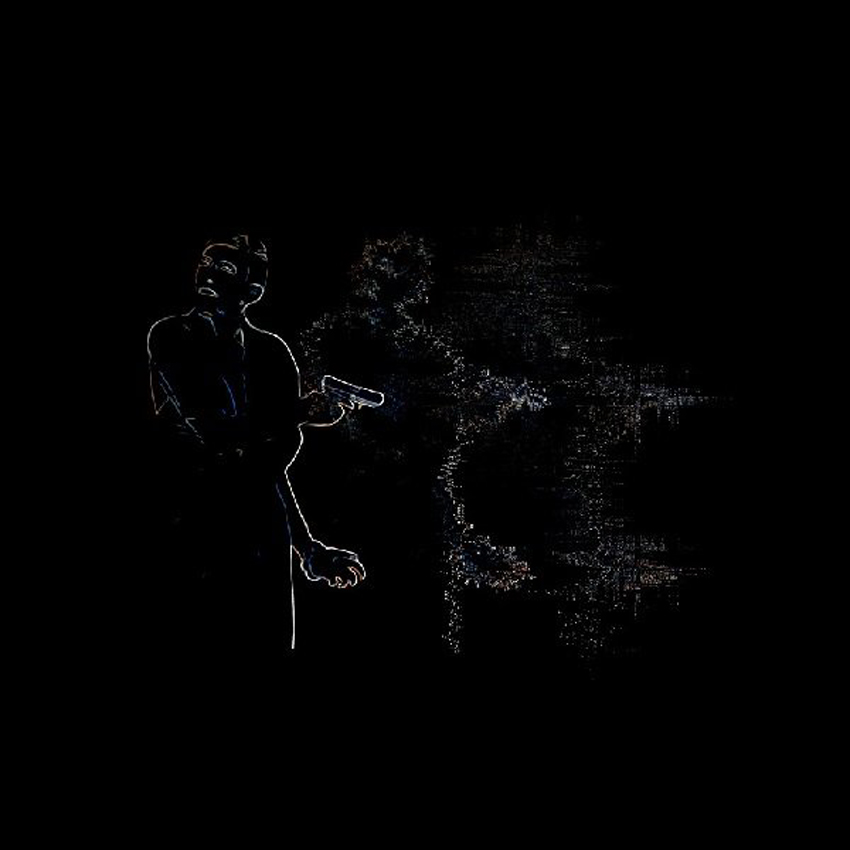Shivers
 Shivers is a new jazz trio (of sorts) featuring Machinefabriek's Rutger Zuydervelt, though "anti-jazz" might be a more accurate descriptor given their willfully plodding rhythms and murky anti-virtuosity.  What the trio have going for them instead, however, is a distinctive strain of creepy, broken-sounding sci-fi brooding, which makes a great deal of sense for a band named after an early David Cronenberg film.  Appropriately, my opinion of this debut closely mirrors my opinion of almost every Cronenberg film that I have ever seen: an inspired aesthetic and some cool ideas, but it seems like it probably could have been a bit better.
Shivers is a new jazz trio (of sorts) featuring Machinefabriek's Rutger Zuydervelt, though "anti-jazz" might be a more accurate descriptor given their willfully plodding rhythms and murky anti-virtuosity.  What the trio have going for them instead, however, is a distinctive strain of creepy, broken-sounding sci-fi brooding, which makes a great deal of sense for a band named after an early David Cronenberg film.  Appropriately, my opinion of this debut closely mirrors my opinion of almost every Cronenberg film that I have ever seen: an inspired aesthetic and some cool ideas, but it seems like it probably could have been a bit better.
While Shivers is ostensibly a new project, both of Zuydervelt's bandmates have been Machinefabriek collaborators several times in the past, just not together.  Perhaps that is why this album frequently feels more like an atypically heavy Machinefabriek album than any kind of fresh, equal partnership.  There are a couple exceptions though, most notably "Otomo," as bass clarinetist Gareth Davis initially unleashes quite a squawking and howling cacophony over Leo Fabriek's clattering free-jazz drumming before the whole thing collapses into buzzing and humming industrial ambience.  Leo and Gareth take charge yet again on the exceedingly baffling "Rabid," but with much diminished results, meandering along in a sleepy vamp for several minutes after a promising introductory firestorm of blown-out drums, noise, and overloaded bass.  I have absolutely no idea what Shivers were hoping to accomplish with that particular piece, as it seems inconceivable that there is anyone alive who wanted grinding industrial heaviness combined with a lazily pastoral clarinet jam within the same song.
For the most part, however, Shivers' aesthetic is much more seamless and successful, though still somewhat unfocused and occasionally a bit perplexing (the synth-heavy "Brood" sounds like a straight-up John Carpenter pastiche, for example) .  The best pieces are the ones that bookend the album, the most impressive of which is probably the opening "Ash."  Built upon a quivering haze of Rutger's guitar noise, crackling electronics, and heavy synth drone, "Ash" weaves a deliciously throbbing and menacing backdrop for Gareth's eerie warbles and whines.  The only downside is that Leo Fabriek's sole contribution seems to be sporadic drum-machine-like punctuations of snare hits and bass thumps, which seems like a waste of his talents (though he eventually comes in with some appropriately shivering brush-and-cymbal work).  Also striking is the comparatively minimal "Spacek," which locks into a lurching, hollow-sounding groove embellished with metallic cymbal swells and a host of squiggles, squeals, and dissonant keys.  Weirdly, however, it sometimes sounds like Davis is playing in another room entirely and that Fabriek just recorded a cool percussion loop and went home.  It is still quite a fine piece though.
"Replicant" closes the album on yet another high note, as Fabriek locks into a stomping industrial-damaged groove while Davis drifts in and out of Rutger's swelling and crackling electronics with melancholy Eastern-tinged snatches of melody.  Gradually, it settles down into a gently simmering shuffle that would not sound at all out of place on a Twin Peaks soundtrack before unexpectedly surging to a snarling close.  More than any other piece on the album, it sounds like both a legitimate collaboration and a legitimate composition.  I wish more of these six songs felt that way, as Shivers too frequently feels like Zuydervelt pieced together soundscapes from improvisations.  That is not inherently a bad thing, but I feel like this debut could have been better with some more effort, more time, and a more coherent focus (more of Shivers sounding like Shivers, less jamming and less John Carpenter).  As it stands, this is roughly just half of a very good album, but it is a promising start to a compelling vision nonetheless.
 



